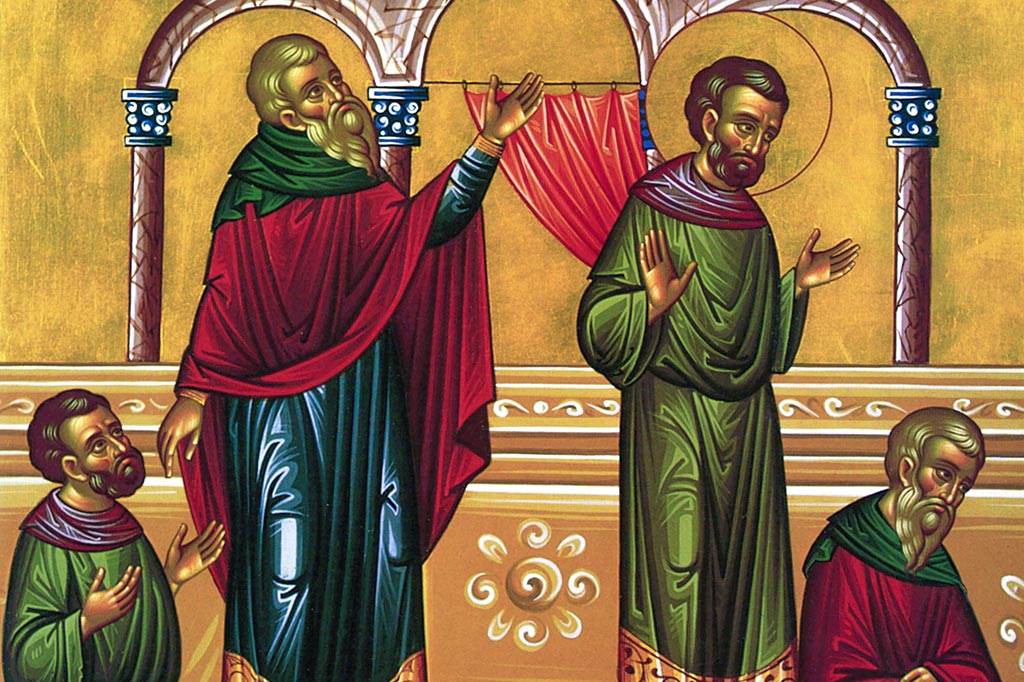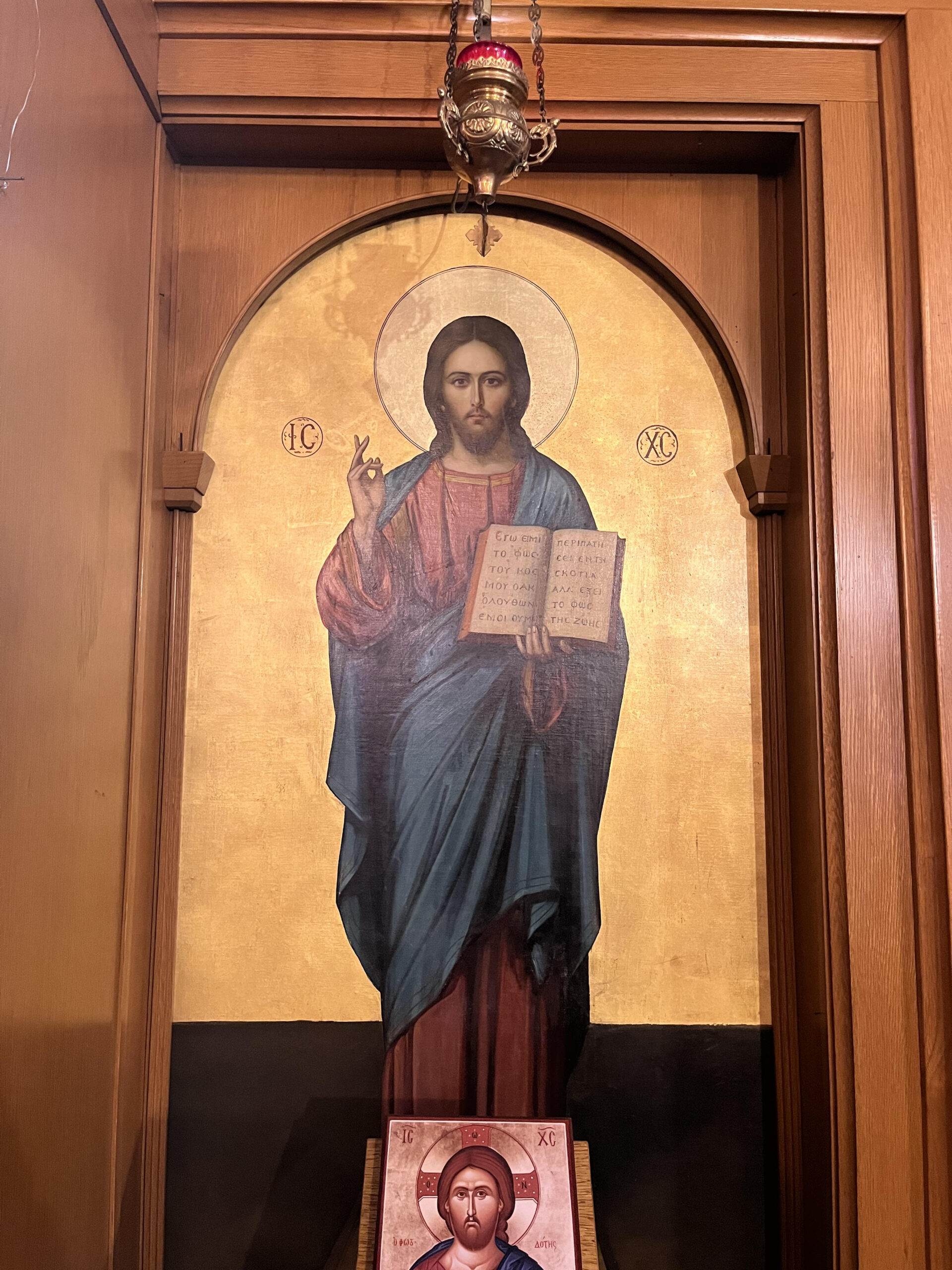But God, who is rich in mercy, out of the great love with which He loved us, even when we were dead through our trespasses, made us alive together with Christ (by grace you have been saved), and raised us up with Him, and made us sit with Him in the heavenly places in Christ Jesus, that in the coming ages He might show the immeasurable riches of His grace in kindness toward us in Christ Jesus. For by grace you have been saved through faith; and this is not your own doing, it is the gift of God— not because of works, lest any man should boast. For we are His workmanship, created in Christ Jesus for good works, which God prepared beforehand, that we should walk in them. Ephesians 2: 4-10 (Epistle of the 23rd Sunday)
Saint Paul often wrote about the subjects of faith, words and grace. Why? Because in the Old Covenant, the Judaic Law was based strictly on “works of the Law.” If one could keep all the commandments, they were righteous in the eyes of God. In other words, one could basically earn their way to righteousness. Of course, in reality, no one could keep all 613 commandments outlined in the Old Testament, so in essence everyone failed to attain righteousness, though some of the temple elite claimed to have.
Saint Paul begins today’s Scripture passage by describing God as “rich in mercy”. (Ephesians 2:4) Mercy is necessary because “we were dead through our trespasses.” (2:5) There is no way that we will get through life keeping all the commandments at all times. And if walking blameless is the prerequisite to “righteousness” then we all fail. The only way we can become righteous in the eyes of God, the only way we can hope to attain salvation, is through his grace and mercy, the only things that can bridge the gap between our sinfulness and His righteousness.
It is grace and mercy that “made us alive together with Christ.” (2:5) There is a parenthesis in the passage that “by grace you have been saved” (2:5) which is developed further in 2:8 when Saint Paul writes “For by grace you have been saved through faith.” For God does not force us to be recipients of His grace. This is where the faith element comes in. We must believe in God, and believe in the message of Christ.
Faith, however, is not enough. We have to do the works of faith. It is not enough merely to love God. We manifest our love for God by serving one another. They go hand in hand. One cannot love God and ignore others. So, faith is manifested in works.
Grace is the God’s part in our salvation. Grace “is not your own doing, it is the gift of God—not because of works, lest any man should boast.” (2:8-9) The “problem” if there is one, with good works, is when good works become competitive, when we think our good works are better than others, when everything becomes about a comparison, or winning. God pours out His grace as He chooses to. This means that God might pour out His grace more on the person who appears to have worked less. Let’s say for example, the person who has a serious illness all his life, never is able to go to school or work, this person might have more grace than the university graduate with multiple degrees who works hard and makes a lot of money. God bestows His grace according to how He feels, not according to our ideas and comparisons.
That being said, we are “created in Christ Jesus for good works, which God prepared beforehand, that we should walk in them.” (2:10) In other words, it is God’s intent for us that we live a life of good works. Everyone has been given a unique talent or set of talents that we are to use to glorify God through service to others. Everyone has the ability to contribute some “work.” Even people with serious illnesses who can’t work at a job have the ability to model patience and provide inspiration. God has created each person to play a unique and special role in His plan for salvation.
To believe that God has created each of us like this is faith. To use what God has given to each of us to serve others is work. And grace is God’s decision to grant eternal life to those who faith and works have pleased Him.
We are given glimpses of God’s grace even in the midst of our faith and works. Grace is what fills the gaps, what completes the things which are lacking. When we are lacking wisdom and all of a sudden we inexplicably know what to do, that is an example of God’s grace on us. When we are scared and all of a sudden become inexplicably calm and collected, that is God’s grace on us. When we, the sinful human being, are allowed by God to partake of Him in the Eucharist, even in our sinful state, that is God’s grace. And at the end of our lives, when we present our less than perfect resumes to God, if He still opens the gates of heaven for us, that is the ultimate example of His grace.
Jonah foretokens Your sepulcher, and Symeon elucidates Your divine resurrection, immortal Lord. You went down into the tomb as a dead man, destroying the gates of Hades. And You rose without corruption, as Master, for the salvation of the world, O Christ our God, giving light to those in darkness. (Second Resurrectional Kathisma of the second set, Plagal 2nd Tone, Trans. by Fr. Seraphim Dedes)
Faith plus works plus God’s grace is the equation for salvation. So look for opportunities each day to deepen your faith and do works that glorify God!
These readings are under copyright and is used by permission. All rights reserved. These works may not be further reproduced, in print or on other websites or in any other form, without the prior written authorization of the copyright holder: Reading © Holy Transfiguration Monastery – Brookline, MA, Apolytikion of Abbot Marcellus © Narthex Press, Kontakion of Abbot Marcellus © Holy Transfiguration Monastery – Brookline, MA.
The Revised Standard Version of the Bible is copyrighted 1946, 1952, 1971, and 1973 by the Division of Christian Education of the National Council of the Churches of Christ in the U.S.A. and used by permission. From the Online Chapel of the Greek Orthodox Archdiocese of America.

